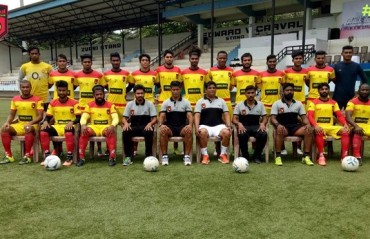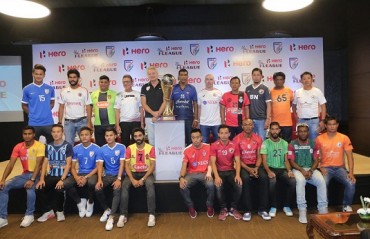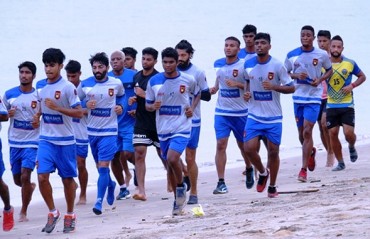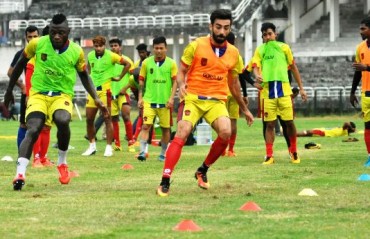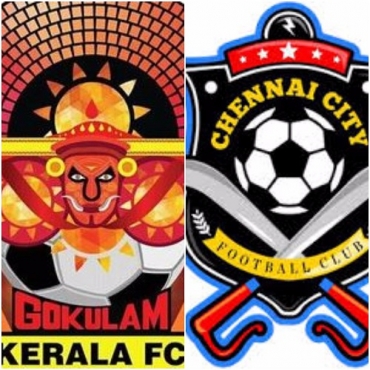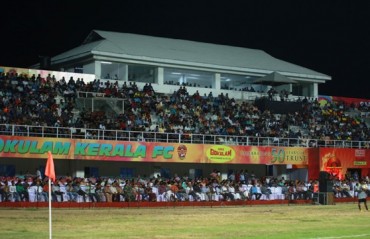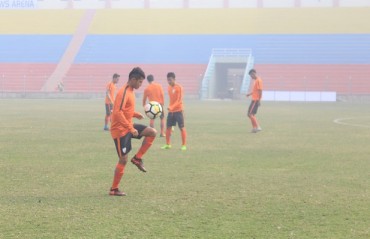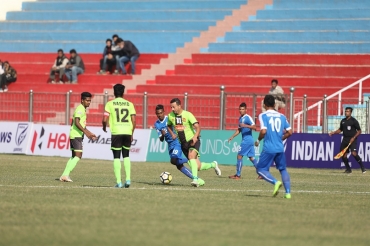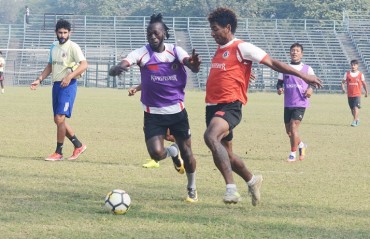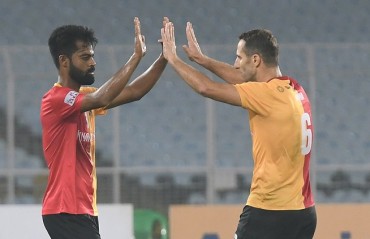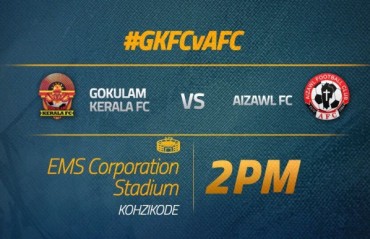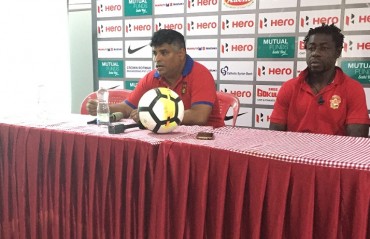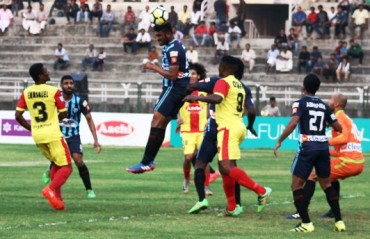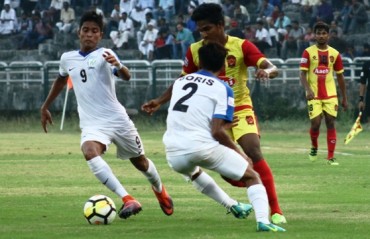#TFGInterview - Of gifts and tiresome waits - Yumnam Kamala Devi's journey in football
- By Chiranjit Ojha

- March 23, 2020
IN THE EVENINGS, the North Frontier Railway's football academy in Guwahati often gets a special visitor.
For the U-19 boys training there, it's something to look forward to. They don't always get to share a pitch with an Indian international.
For the visitor, it's an essential part of keeping up with training and fitness requirements. But more than that, it gets her some time on the grass playing the sport she has chosen as her path for life.
Just a few weeks ago, Yumnan Kamala Devi was sprinting down the length of the Bangalore Football Stadium, playing 3-4 games a week under the afternoon sun, taking a leading role in helping Gokulam Kerala FC win their first Indian Women's League title.
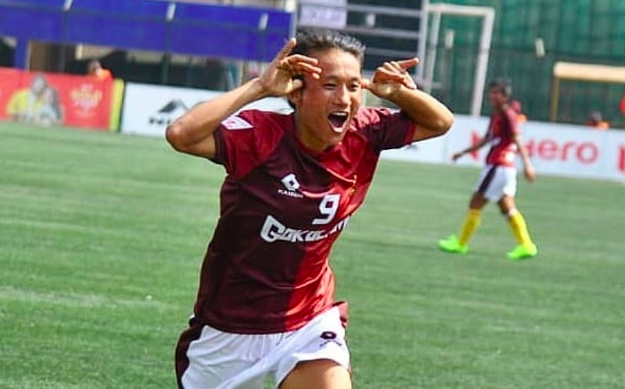
Now, she's enduring a months-long wait for the Women's National Football Championship. Asked how she's coping, Kamala laughs,
"It's so tiresome, just waiting for the Senior Nationals. The wait is way more exhausting than actually playing the matches."
The ongoing coronavirus pandemic has forced the I-League to come to a halt and postponed international fixtures, causing players to sit out not knowing when they'll get to return to competition. Ironically, this troublesome phase they are facing is just the norm for their female counterparts.
Kamala paints a quick picture of life as a female footballer in India to make her point,
"Before IWL, we used to wait all year for the Senior Nationals. I'm not blaming AIFF or anything, but having just one major tournament, that too a relatively short one, the gap was just too long. We'd be practicing forever with no idea when it was happening and where. Then suddenly it would get announced and teams would be made on short notice. Next thing you know the tournament starts and ends in a whirlwind and soon you're back to that old grind of practicing and waiting for the next edition. It was exhausting; not playing the tournament, but the wait for it. That's why when IWL was announced for the first time it got such a great response from players. As far as we were concerned, we now had two big competitions instead of one. Every last player was determined to do well and put on a good show, we wanted to make sure this new platform succeeds and does not go away. We were all excited, that finally like the men we were also getting a league. Especially the junior players, it was a big opportunity for them to prove themselves. We should have more tournaments like this."
While the national team has seen a record increase in activity - the WNT played 32 matches in 2019 - life for the domestic players remains fragmented where they spend months without a club or a proper team to train with.
For a footballer, who thrives in competition within a team, being without neither for a prolonged period is unsettling. Many a players who have been out due to injury, or suspension, or failed to find a club have spoken about the absolute loneliness that comes with that situation, and the continuous frustration that they find hard to shake off. One of the biggest struggles during that period, they say, is to find motivation to keep up their toils.
Kamala deals not only with the sparse women's domestic calendar, but also a loss of a different kind. She was one of the several Manipuri players who boycotted the national camp, alleging preferential treatment. Since then, she has never made an appearance for India. She talks about the heights of that controversy as a dark time, a time when she questioned her relationship with football itself.
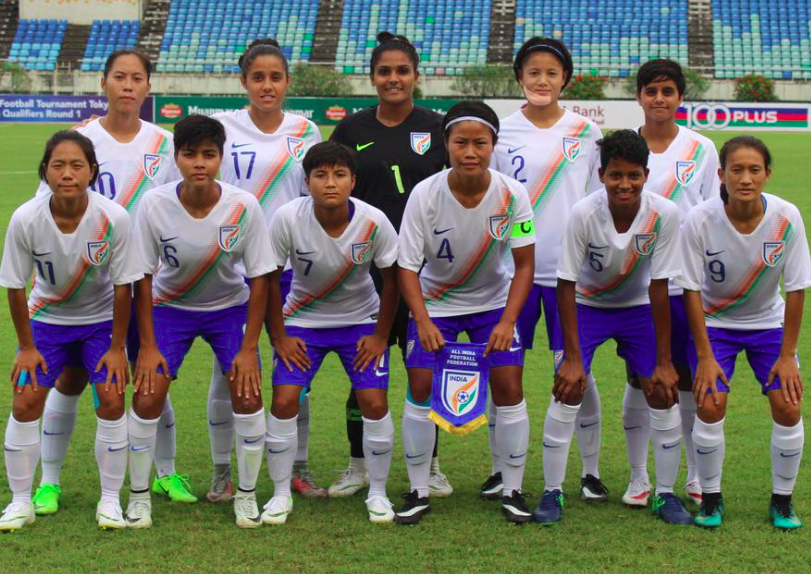
Asked what kept her going, she talks about gifts she had to give to people she cared about..
As a young girl in Thoubal, Manipur, Kamala was always outgoing. And nothing appealed to her more than sports,
"Whenever I saw a game going on in the neighbourhood, whether football, cricket or chepak takraw [kick volleyball], I wanted to join. Often I'd be the only girl playing with boys way bigger than me. The boys in the locality would mostly let me join. Especially when they were playing chepak takraw which was three-on-three, so sometimes they'd be one short and I'd make it even for them."
A natural athlete, she held her own in whichever sport she played. For her, it was about enjoying herself on the field, and she didn't particularly prefer one sport over the other. The seeds for her particular passion for football were planted during a visit a market at Imphal with her father,
"I don't remember when I started playing football... I think it was at school when I was very young. We were just kicking a ball around, I didn't even know what the sport was called. Later, one day I was at the market in Imphal with my father. He told me there was a Manipur inter-district women's match going on at the Polo Ground and asked if I wanted to watch. I was surprised, because I didn't know they had women's football tournaments that are played in proper stadiums. So me and my father sat down and watched the whole game. It was that day I decided that this was what I was going to do. I wanted to be out there playing in a ground like that."
While she at this point she knew she wanted to be a sportsperson, which sport she would commit to took a longer consideration,
"Honestly, I probably could have gone into cricket as well, but that would have cost more and there were less scholarship opportunities; the amount was between Rs 200 and 300. But for football there were more scholarships available. You could get from Rs 500 to 700 and even the kits were covered, which meant there would be no pressure on my family to pay for it. That's why I chose to go with football and stuck with it. I knew if I could stay true to my passion, I'd be able to play for India and even get a good job."
On the pitch, she was a natural fit for an attacking midfielder or a striker. It wasn't long before she was spotted as an outstanding talent among her local peers; a coach suggested that she should try out for Manipur sub-junior team. Most of the family members weren't thrilled at the prospect of her leaving the house and going around the country by herself playing football, but she went along with it anyway,
"Initially there was no support from my home at all. They told me to be and live like a girl, do this don't do that... but I was always into sports... the bhaiyas in my locality were always supportive... later on it was one of them along with a coach who took me to the Manipur Football Association and helped me get into a club. That's how a got a chance to make it to the sub-junior state team. We went to the nationals in Tamil Nadu and became champions. That proved to be the turning point for me as a footballer."
Once Kamala was playing at the national level, she came into her own and was immediately pegged as a prospect for the nationa team. Her perfrormance at the sub-junior nationals got her picked for the U-16 national camp in 2006, but for some reason the camp was cancelled. In 2008, at the age of 16, she was picked for the India U-19 side for the AFC U-19 Women's Championship Qualifiers in Kuala Lumpur. Although India lost every match by large margins, Kamala did enough on the pitch to catch the coaches' eyes. From there, it didn't take long before she realised her biggest dream; to play for the senior national team along with some of her idols. Kamala recalls that time as one of the happiest phases in her career,
"Everyone wants to play for the national team. When I started playing football, that was my ultimate goal, to play for India with our seniors. First time playing in an India jersey was exciting and I enjoyed every moment of it. Then in 2010 I got a chance to play for the senior team, at SAFF Championship and SAFF Games. We won both tournaments. Finally, I was in the same team as Bembem Devi, Bala Devi, Tababi Devi and Gitarani didi... all those senior players. Initially there was a bit of a doubt in my head whether I'd be able to adjust my game to fit with the senior team. But I was determined to get into the playing eleven from the very beginning. I had put in my hard work in domestic football and paid my dues in U-19 national team. So when the national camp happened in Lucknow, I put in everything to impress the coaches. Everybody was supportive, from the coaches to the seniors. We used to spend hours training in the sun and afterwards sit together and discuss the game plans. The seniors used to share experiences and tell us how to handle certain situations. Sometimes Bembem Devi or Tababi Devi would say, why are you running so fast? They'd say to maintain speed with the rest of the team, receive the ball with more confidence. We juniors were in awe of them, and every time they told us to do something we would go beyond ourselves to play like that."
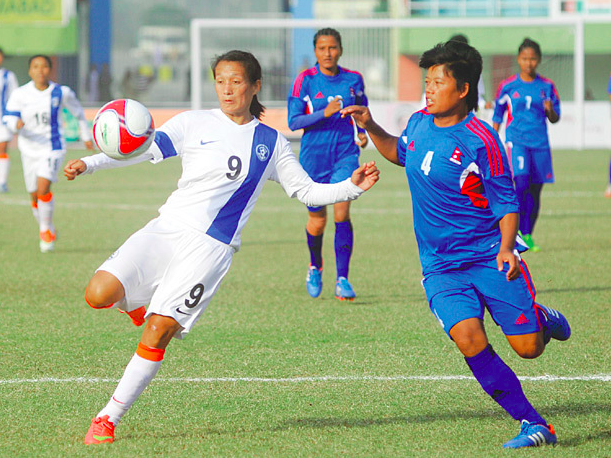
At this point, Kamala was living the life of a professional athlete; shuttling between national camps and the Manipur state team. This was a comfort zone she was fond of; a number of Manipuri players were a part of the national camp, so she never really felt alone or out of place. When she wasn't at camp - which was plenty since the Senior Nationals were not held in 2012 and 2013 - she could be at home.
A couple of years into her being an active Indian international, she tried out for a job at the Indian Railways. The Railways were taking the upcoming 2014 Senior Nationals seriously, and re-building their squad with an aim to challenge the duopoly of Manipur and West Bengal in women's football. Kamala easily made the cut, and for the first time, it was time for her to really leave home. She would have to live where she was posted, and play in the Senior Nationals from the Railways side. Both in life and her game, this was an act of stepping into the unknown,
"In the Manipur team, we had developed an understanding over time. We knew how best to pass to Bembem Devi or Bala Devi, who would go which way in what situation. We didn't even have to say it to each other. So when I went to paly for the Railways team, it was the first time I was re-adjusting to a new squad at a high level."
Kamala's first season playing from the Railways at the Senior Nationals saw them lose to Manipur in a group stage match that was practically a quarter final. Next season, a more robust and better-coordinated Railways side faced Manipur again at the final, which happened to be Bembem Devi's last appearance for the Manipur team.
What unfolded was one of the best finals the Senior Nationals have seen this century. After 90 minutes, the scoreline was 2-2; Bala Devi and Dangmei Grace had scored for Manipur while Ashalata Devi and Sasmita Malik had found the net for Railways. In the 100th minute, the veteran Bembem Devi put Manipur ahead, but minutes before the final whistle, it was another Manipuri player, Bijeta Devi, who scored to make it 3-3.
The match went into penalties. Going into the fifth kick for Railways, the game was once again tied 3-3. Up for the decisive take was Yumnam Kamala Devi.
With a cold-headed right footer, she beat the keeper and shook the net.
This was the first time Railways had won the championship; the fourth team ever to lift the Senior Nationals after Bengal, Manipur and Odisha.
What Railways had done with their recruitment of prominent players from across the country and winning the championship was one of the first power moves by a domestic team in Indian women's football; akin to a club spending heavily to load their first team up with top notch players. As Railways employees, the players get job security; and in turn, Railways have now become one of the most formidable teams in the country. Since their maiden championship win, they have reached the final twice; and the match between Railways and Manipur has become the biggest rivalry in the Senior Nationals.
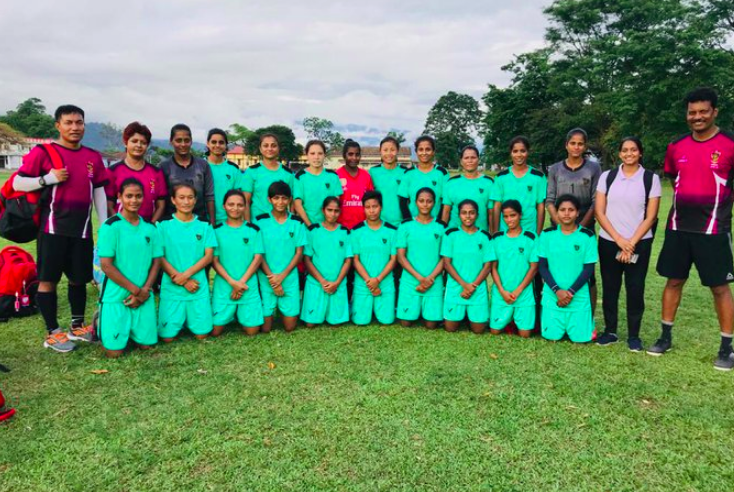
The victory propelled Kamala to star status in the Railways family and made it easier for her to adapt to a work-life unlike what she had originally imagined for herself,
"Initially football was everything for me, so I trained hard and lived the game fully till about 2011. But when I got the job in railways it initially became difficult because I had to go to the office, do my job there and at the same time try to keep up with practice. However, things have become a lot better since then; nowadays we sportspersons don't have to show up at office for 330 days, we are allowed to focus on our fitness and training. They've supported us a lot; without Railways I wouldn't have been able to maintain my fitness level... earlier I was in Hajipur, Bihar. Then I was transferred to Guwahati. That has worked out well for me, because over here there's a lot of emphasis on football, both for men and women. The coaches and academy officials were also glad to have me here, they made me feel home. Here I have all the facilities I need."
2016 was a landmark year for Indian women's football, and for Kamala as well. In January she won the Senior Nationals with Railways. In February, the second edition of South Asian Games was held in Shillong. The Indian Women's National Team, defending gold medalists, started the campaign with two hard-fought goalless draws with Maldives and Nepal. The Blue Tigresses then staged a dramatic comeback, beating Bangladesh and Sri Lanka to qualify for the final.
On 16th February, they faced Nepal in front of a crowd of 23,000; one of the biggest home audiences the Indian Women's Team has ever attracted. It was Yumnam Kamala Devi who rose to the occasion, scoring the first two goals to break the Nepali defence's back, before Bala Devi and Ashalata Devi piled on two more to bury the game.
With 5 goals, Kamala was the highest scorer of the tournament. She was arguably the player of the match in the final, and the toast of fans all around the country in one of the most spectacular modern era performances by the team.
At the same time, a gigantic phase shift was happening in Indian women's football; the first ever Indian Women's League was about to kick off in October. Having a national league and laying down the seeds for professional club careers for female players had major ramifications like longer seasons, better pay and more opportunities for quality training.
For Kamala, personally, it was a second chance at realising a dream she's had since the beginning of her career,
"Earlier on I wanted to focus on doing something for my state. I wanted to play for Manipur, get a job in Manipur. But soon monetary concerns became the priority and there was a lot more money and security playing outside Manipur at a team like Railways. But when the AIFF launched the Indian Women's League, it gave me a second chance to come back to a Manipuri team. The club also asked me to come over and play for them this time, since it was a historic occasion they wanted to do well. It meant a lot to me. I was determined to put everything on the line to do well for Eastern Sporting Union and live my dream through that club... I was grateful for the opportunity and I wanted to give them a gift in return."
The Imphal-based Eastern Sporting United had amassed some of the best Manipuri players in the country. Under the tutelage of Bembem Devi, reunited Kamala with most of the Manipur state team's core, including the likes of Bala Devi, Umapati, Premi Devi and Mandakni.
The club began their campaign in the preliminary stage with a hard-fought 3-2 win over Jeppiaar Institute, one of the stronger sides in the group. Kamala scored, while Bala Devi got a brace. In the next match, Kamala got a brace along with Bala Devi and Premi Devi scored a hat-trick as Eastern Sporting Union defeated Uttar Pradesh 13-0, cementing their place as one of the favourites. They beat Kryphsa in the next match and qualified for the final round as the group champions, where they were being considered a front-runner along with Risting Student's Club from Odisha.
After winning their first match 7-1 in which Kamala got a hat-trick, it was finally time for the clash of the favourties. On 30th January 2017 Delhi's Ambedkar Stadium witnessed one of the best games of the season; where the Rising Student's defence gave the Eastern Sporting Union attack their first tough outing. Although Eastern took a lead early on, in the second half two Indian internationals Sasmita Malik and Ashalata Devi scored for Rising and clinched the victory.
For the rest of the league stage, Eastern Sporting Union were playing catch-up. They kept winning, but it wasn't until Kamala's goal helped them beat Alakhpura - the only club to beat Rising - in their last game before semi-finals that it seemed like the momentum was swinging back in their favour.
In the semi-finals, when the wear-and-tear of playing 5 matches in two weeks under challenging conditions had started to show on many players, Yumnam Kamala Devi hit peak form. She scored a hat-trick as Eastern beat Alakhpura 4-1 to reach the final, which was a re-match with Rising Student. There, at the big stage, Kamala rose up again; scoring twice as Eastern exacted a 3-0 revenge on the only team that had beaten them in IWL till that point.
Kamala had emerged as the decisive factor in the most important stage of the competition, and also become the overall top scorer with 12 goals; leaving second-placed Sasmita Malik (7 goals) far behind. The performance sealed her candidacy for the AIFF Woman Player of the Year award, and it's safe to say she made good on the gift she had resolved to give to the Eastern Sporting Union club.
But when asked about the 2016-17 IWL campaign, the first thing Kamala recalls isn't herself becoming the historic top scorer in the first ever national level women's league in the country. She instead talks about how it felt to play out there as part of a team,
"That time the ground in Delhi wasn't in great condition, there was lack of grass on the pitch. But player accomodations were great. This season, the ground wasn't that good but the place where we stayed was awesome. I've come to notice this about women's football, if we get a good ground, the accomodations turn out to be not so good and vice versa... you know, we can do a lot better if we get a bit more support for women's football from the goverment. We may not play like the boys do but we'll give it our best... I sometimes feel proud of my fellow players, because despite having such bad conditions they played their best. Last year at the Senior Natonals was water everywhere on the ground, it was slippery and controlling the ball was a headache. Still we played, we managed to score goals and enjoyed outselves. That's how we approached the sport. If you gave the same condition to the boys, I don't think they would have wanted to play and the matches would have been cancelled. But the girls are so happy just to get the chance to play, they never want to let it go no matter what."
This tendency to define experiences through the perspective of her team and players rather than a personal viewpoint is perhaps a defining characteristic of Yumnam Kamala Devi as a footballer. Perhaps it also played a role when she participated in the controversial boycott of the national camp along with 6 other Manipuri players in March 2019, alleging favouritism by some of the coaching staff and a dissatisfaction with the way AIFF handled the situation.
A year after the matter first became public, it's mostly receded to the rear view mirror for everyone involved. Bala Devi, one of the most high profie players involved with the boycott, has since returned to the nationa camp. Kamala has not; and she's mostly decided to settle in with her own routine,
"See, I've talked about this topic so often that it's exhausting at this point. So I don't want to get into it all over again. Right now, how to put it, it's done. It's behind us. We've done whatever we needed to do at that situation. AIFF should have assumed some responsibility, but we got no such signal from them. And I'm not worried about the team, the new players who are coming up are better than me. They are scoring twice as often as I do. They're not lacking quality players. So it's not something I'm going to focus on."
The situation in the dressing room of the Indian Women's Team had started going sour from 2018 itself. Kamala says the episode had a deep impact on the way she sees the sport itself,
"After I left the national team, I was living through a lot of negativity. It was like... not playing for India felt like a part of my mind, a part of myself was just not with me any more. I was thinking, I had put my life into this sport, but why did football do this to me? Then I played in the IWL for FC Kohlapur City. Being back on the pitch sort of centred me. Because my performance wasn't satisfactory. I realised I needed to focus on myself not on situations beyond my control and focus on my performance. When the Senior Nationals started, my coach and teammates were all backing me. They were saying you are a senior player, you have to score goals. They were working hard on giving me great passes. They motivated me and I started loving it all again; the practice sessions, the hard work, the matches, everything. We reached the final and I scored 20 goals in the tournament. Although we couldn't be champions we never quit trying. That brought me back to my usual self."
Professionaly, she's well set with her job at the Railways and a robust club career. But emotionally, she still misses national duty,
"The SAFF Championship we played in Sri Lanka was special. Bembem Devi was captain at that time. We played Nepal in the final. We won 3-1 and I scored a goal... also memorable Women's Asian Cup qualifier match we played against Palestine in their own country. We played well there, everybody performed the best they could... we could have beaten Palestine but they got a penalty in the second half and we ended up with a draw. We really wanted to win that game, and we came so close to making it to the main tournament... I still wonder if a couple of things had gone our way we would have been playing in Asian Cup!... I really miss it a lot, sometimes, playing for the national team."
Whenever the Blue Tigresses have been in action, Kamala has made sure to keep an eye. She was especially interested in the second round of the Olympics Qualifiers, believing India had a chance to finally vanquish their old rivals Myanmar and qualify for the next round. She was also impressed with the performance put in by the new players who have gone on to replace the old guards like her,
"I wasn't there at the second round in Myanmar this time. The new girls who took over at the national team played so well. I was watching every match and praying for us to get to the third round. It didn't matter if I was there or not, India had to win. At the last match we were had a 3-3 draw with Myanmar and didn't qualify by goal difference. I was very saddened by that result, it never feels good to get so close and yet not make it. But I was very impressed by how hard the new players have been working. They were putting in more effort than me. It was great to watch."
Despite being away from the national camp, her performance at the Senior Nationals made Kamala one of the most sought after players going into the 2019-20 edition of IWL. Gokulam Kerala FC had been beefing up their squad for an apparent title bid, recruiting some of the most experienced names in Indian women's football. Kamala naturally made for a suitable signing.
Being the season preceding the U-17 Women's World Cup, there was a lot of interest around the 2019-20 season. The live streaming quality was beefed up, the commentary was good and there were decent efforts to promote the event online which, coupled with the popularity gained by the Indian women's team over 2019 through their performances, made it the most popular edition of the league yet.
Added to that was Gokulam Kerala FC's efforts to do right by their women's team. Kamala was impressed with the way the players were treated, and it served as an anti-thesis to her recent experiences at the national camp,
"This season the IWL was a big improvement from the previous edition. The Gokulam Kerala FC management put a lot of effort behind the team, from the coaches to the officials. We were playing with them in mind; they had given so much value to women's football so we had to do something for them that made it all worth it. The club us like we treated our senior players. Whatever we needed, they worked hard to provide it quickly. No one was lacking in anything whether it was food or other requirements. So we put everything on the pitch. We the players got together before the final and decided, this title would be our gift to them. That was our biggest motivation."
Gokulam Kerala FC faced little resistance all the way until the final. The team had a diversified attack, with Nepali international Sabitra Bhandari leading the offence. Kamala fit right into her more withdrawin, supportive role and got a bunch of assists, as well as a hat-trick of her own, as GKFC brushed aside every other team in the group stage amassing a goal difference of +26. In the semi-finals, they beat Sethu FC, considered the dark horses of the season, by a comfortable 3-0 margin despite facing some real competition for the first time.
This set up a final that was significant in many ways. Not only were GKFC facing the only other undefeated team in KRYPHSA, but it was a team coached by one of the very national team staffers who were at the heart of the national camp controversy.
As the final started, GKFC got their break-through at the very first minute through Irom Prameshwori Devi. Not long afterwards, Kamala scored, extending the lead and becoming the third player ever to score in two IWL final matches.
But KRYPHSA weren't going down without a fight. Dangmei Grace and Ratanbala Devi scored back to back to make the game 2-2.
The last twenty minutes saw an all-out offensive battle between the two sides. Many chances were created and there were multiple near-misses. But ultimately it was the season's highest scorer Sabitra Bhandari who delivered the decisive blow, scoring with just three minutes left and securing the title for GKFC.
The "gift" that Kamala and others had resolved to provide to the team management was now fulfilled.
The celebrations around the winning team was unlike any other previous winners. The players were brought to Kozhikode along with the trophy and felicitated. They even took a special victory lap at the EMS Stadium in front of the home crowd during one of GKFC's I-League matches.
🏆 CHAMPIONS OF INDIA 🏆
— Gokulam Kerala FC (@GokulamKeralaFC) March 1, 2020
💥When the champions took the centre stage at the EMS Corporation stadium💥⚡️🥳🥳🥳#Malabarians #GKFC #ShePower #Champions #IWLChampions pic.twitter.com/dQ4zrMBOaN
But when asked about what she thought of the win, Kamala doesn't focus on her record of scoring in two IWL finals or two winners' medals; not even on the celebrations in Kerala. Instead, as often, she talks about the next step; or in this case the lack of it,
"I went to Kanteerava for the Bengaluru FC vs Maziya game. Sunil bhaiya and others tried so hard to win but they lost in penalties. But it was an enjoyable game. I was watching it and thinking, why don't we have an AFC Cup for women? We have just become Champions of India with Gokulam Kerala FC but there's no continental tournament for us to enter as a reward. I think AIFF should talk to AFC about making something like this happen. This year's too late but if they get it done for future IWL champions it would be great for taking women's football forward. It will motivate more girls to take up the sport and benefit the Indian national team as well. With that kind of help and experience we can even make it to the World Cup."
Playing in the World Cup is a theme that keeps coming back when Kamala talks about Indian women's football. She believes that the women's team can make it there before the men's team if given adequate help by the AIFF and the government. The U-17 Women's World Cup, according to her, is an early step in the right direction but much more needs to be done,
"The new players who are coming up now are way more talented than us. A little help will do wonders for us. Look at how much focus there is on men's football. Put 10% of that on women's football, we can easily get into Asian Cup and aim for a World Cup qualification. The Federation, government and all the clubs are putting much more resources into women's football now than they were before... they may be wondering when they'll see results, but I'll just say, please, do a little more. You'll be pleasantly surprised. I have seen the next generation of players. This lot can go very far... last year the women's team played lots of matches and the U-17 Women's World Cup is coming up. With the boys they put in a lot of effort with tours and practice matches to build up the team. The girls are also getting some exposure and international experience. All this will add up and pay off later even if we don't start winning big trophies immediately. The efforts to improve them from the junior level should continue long term; if not for three years like the boys, at least a year and a half... maybe do something like Indian Arrows in IWL. I'm confident these girls will make it happen."
One positive outcome from recent efforts, she feels, is the increased awareness of women's football among fans,
"I do see more people becoming aware of women's football. There's a lot more response we get on social media. At the matches too, more people show up. Some games that are expected to be good or high stakes get bigger crowds so you know people are following the league. So there's change happening. But I feel there should be a lot more support for women's football. The fanbase is growing but I hope it grows a lot faster."
But what hasn't changed, for her and other female players in this country, is the long wait for another short window of opportunity in the form of the Senior Nationals,
"Right now there's no tournament to play in. We are just going to have to wait for Senior Nationals. I'm looking forward to playing for Railways again. But that's months away. That's why I keep saying there should be more domestic tournaments for women. That'll help the junior players gain experience faster. Right now, we just wait and wait for the next thing. We grow tired waiting."
Recently, Kamala turned 28. While she feels there are a good few years still left in her playing career, she has already begun thinking about what to do afterwards. Asked what her plans are after she hangs up the boot, she brings up a dream she has had for a long time,
"It's been in my mind, to help the next generation get started in pursuing football. I don't know if I'll be a coach or not. But I want to open my own academy. I want to have a dedicated ground where those who don't have enough money or support from family can come, play, learn and be taken care of. After my playing days are done, this is what I want to do. It might take a while to accomplish this, but everything takes time and effort."
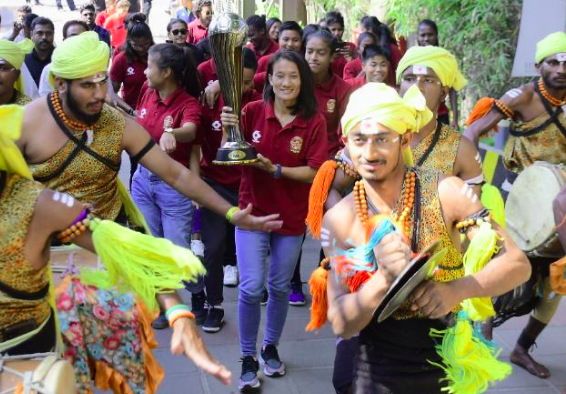
Having come up through a dressing room culture where the junior players often looked up to the seniors as de-facto mentors, Kamala has tried to play the same role for the newer players. But with a bit of disappointment she notes that a growing generation gap and vastly different outlooks towards the sport has somewhat changed that dynamic,
"Back then we used to pester our seniors for advice all the time. It still happens but to a lesser extent. But it feels good when it happens, when players show interest in learning from our experience. I love helping them out like I was helped by Bembem Devi and others."
Kamala understands that going forward the differences between older and younger players are only likely to grow. But she doesn't see this as a bad thing necessarily,
"The biggest difference in the next generation will be the kind of experience they will come in with. Playing in the U-17 World Cup is no small matter. The exposure to world class football will shape them into much better footballers than we've ever had before if they keep working hard. They should never lose focus and try to maintain their standard, and always aim to be in the World Cup again. With AIFF's help that will happen, I believe. Our batch didn't get a push like this. I mean, we still got some help. Nike was sponsoring, we got to wear great shoes and jerseys when playing for the country. When Bembem Devi was playing at the youth level they got way less. That's why the senior players were protective of us, whatever we needed they used to talk to management and get it for us."
Overall, Kamala says she's happy with the way women's football is moving forward. Opportunities have increased both at home and abroad; teams are playing more matches on foreign soil and many players are seeking careers aborad. Most recently, Bala Devi made headlines when she got signed by Scotland's Rangers FC after a trial. But while being the most notable export from Indian women's football, she's not the only one drawing interest from other countries. Kamala recounts how she herself was approached with opportunities to play aborad which she regrettably turned down at that time,
"Back when Bembem Devi was playing for New Radiant in Maldives, one of the players from the club that came second, MNDF, contacted me on social media pand said come if you want we're about to have our league. I didn't have much of an idea how it would be. I also was apprehensive about going alone. My Hindi isn't good and English is bad... I didn't go and later regretted it, thinking it was going to be my one chance to play abroad and I lost it... a coach had also contacted me during the first round of Olympic Qualfiers; he was from Scotland but lived in China. He asked if I wanted to go to China and play in the league over there, it would be a six month season. But I don't know... I still had a bit of fear, I think. About going abrod all by myself, not knowing the language. So I didn't go, again. Now I realise my mistake. Football has no language, on the field you can learn to communicate very easily. I was like, why did I make that mistake again? I felt very bad about it... if I get an offer like that I'll jump at it. I'm ready to put everything in, and test myself."
However, due to the ongoing pandemic, football remains suspended in most of the world and with it, any hopes of more Indian female players being recruited by foreign clubs where they can experience a long season and gain valuable experience.
So, for now, Yumnam Kamala Devi must do what she has done for most of her career: wait. Wait for things to become normal, then for the Senior Nationals where she hopes good performance will lead to more opportunities. She may return to Gokulam Kerala FC, or be recruited by some other club; but nothing will be known for sure for months ahead.
Uncertainty, the single biggest factor that dissuades young prospects from taking up football as a profession, is systematically baked into Indian women's football in its current state. And as Kamala once again prepares to face that long wait, she once again looks for motivation through the single most compelling desire that fuels her career and provides meaning to her performances: turning it all into a gift of somebody she cares about.
This time, it will be for the someone who influenced her and countless other women in their early years as footballers; first as a player then as coach,
"I guess what I really want to do is to put on performances that people remember. If fans are taking the time to watch my team play, I try to make sure they see something that makes them talk to their friends about the game, about women's football. That way more people will come to appreciate our players. I've never felt like I'm some big time footballer. I do this because I really love it, I enjoy every moment I'm out there playing the game. I'll do this as long as I can, then I'll try to help others through my academy. Bembem Devi has done so much for me and women's football, and she's still doing it to this day. So this will be my gift to her."











